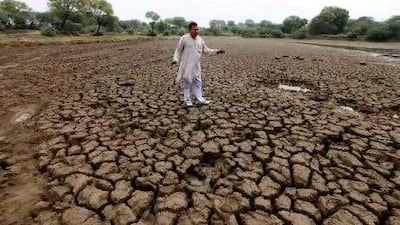KATHURA, HARYANA // The farmer walks past muddy fields of stunted sugar cane and damaged rice paddies as a light drizzle falls.
"Too late, too late," Satyavan Narwal says of the rains for which he has been praying since many weeks ago.
For nearly two months Mr Narwal's eyes scoured the heavens looking for the monsoon rains that would nourish his crops, but he found nothing and was left with parched earth.
Now monsoon showers are soaking the fields - but late August is much too late for him.
This year's fickle monsoon has played havoc with millions of Indian farmers. The showers, which normally run between June and September, are crucial in a country where 60 per cent of the population works in agriculture and less than half of the farmland is irrigated.
"Here farming is entirely on God's mercy. If nature doesn't bless us, the farmer can't do anything," Mr Narwal says.
India's meteorological department said it expected the country to receive at least 10 per cent less rain this year than in a normal monsoon, but large parts of the country have been hit much harder.
In the north-western state of Haryana, where Mr Narwal's family has farmed for generations, rainfall is less than half what it should have been. And when the rains finally did come, the crops were nearly dead, fit only for animal feed.
Shrivelled old men share a water pipe and one of them points to the skies and shouts, "What now, brother?" as they watch men and women carry damaged sugar cane to feed to their cattle.
At the edge of fields young men stand, hands on hips, shaking their heads in dismay. The village is 140 kilometres north-west of New Delhi.
By now the sugar-cane crop should have been at least 2.4 metres tall. Rice paddies should have been lush and emerald green. Small patches of pearl millet, corn and sorghum would have dotted the landscape.
But the sun shone on with determination through all of July and most of this month, so that the cane is now only knee-high at best and most of the rice crop is burnt.
The lack of rains has also been partly to blame for the severe power cut that affected half of India last month.
Large-scale farmers were using extra power to pump water from deep aquifers, and little electricity was being generated by hydropower projects.
Across the country, rains in June and last month were nearly 20 per cent below normal.
"Now some of the crop is so dry and damaged even our cattle won't eat it," says farmer Mahinder Singh, as he watches the cleaning up of his sugar-cane fields.
Punjab, the unofficial breadbasket of India, has received less than 40 per cent of the rain it should have. Large swathes of western Gujarat and Maharashtra have been declared drought-stricken.
The government has said it is not worried about food scarcity because millions of tonnes of rice and wheat from earlier bumper harvests are spilling out of state-owned granaries.
But for the average farmer, who lives and earns from season to season, a poor monsoon means food must be carefully rationed because he has little money to spend.
With dreams of a good harvest, most small and medium-scale farmers borrow money, often at exorbitant interest rates, from local lenders to buy seeds and fertilisers and hire tractors to plough the fields.
"Now even they won't give farmers money. They know there are no crops so there's no chance of recovery," says Ranbir Singh, as his 1.2 hectares of dead sugar cane is cleaned up.
Mr Singh already has to pay off loans of 300,000 rupees (Dh19,800), a fortune for a poor farmer.
"Now I will need to borrow more money to feed myself but lenders will hold back," he says.
With nearly 70 per cent of India's population living in rural areas, farming is vital to the economy. A poor monsoon is expected to further dampen already disappointing growth this year, said the Citigroup economist Rohini Malkani.
Poor agricultural output could result in growth as low as 5.4 per cent in the current fiscal year, down from the bank's estimates of 6.4 per cent, Ms Malkani's report for this month says.
"If drought conditions worsen, headline growth could come in lower at 4.9 per cent," she writes.
The federal government and many state governments have hesitated to declare a drought for fear of causing panic, and because it requires them to assess each farmers' losses and compensate them.
Farmers in Punjab, Haryana and Uttar Pradesh, which have not been given declarations of drought, are losing patience.
"What will it take for the government to declare a drought?" asks Mr Narwal. "Will all the farmers have to die first?"
Sharad Pawar, the agriculture minister, says cabinet ministers will meet this week to discuss the effect of the poor monsoon.
But in Kathura village, the top district officer Pankaj Aggarwal brushes aside talk of a drought, saying the few days of rain will revive the crops.
Meanwhile, farmers lament the lack of government investment in irrigation and other infrastructure that could protect farmers from the vagaries of the monsoon.
"Where are the irrigation canals, the irrigation pumps, the electricity supply that the government keeps promising the farmers?" asks Dharmendra Malik, a farmer and activist in Uttar Pradesh.
"You have food grains in your stocks so you're not worried but that doesn't mean you abandon 600 million of your people who tend the fields."

